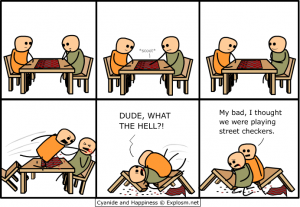Among the gifts JP received for Hanukkah this year was a checkerboard that I picked up at the dollar store. Last night we played for the first time, and not surprisingly (I hope), I won. Unfortunately this disturbed JP quite a bit, and the end of our two checkers games included some tears, a rather lengthy hug, and an explanation on my part that he shouldn’t be sad that I beat him, that he needs to practice and get better to beat me, and that, no, not everyone in life gets an equal share of victory, and while that may or may not be fair, it’s kinda the way it is.
As I was telling him this—and congratulating myself on being a rocking good checkers player—I realized that in practically every other instance, I let JP win. If we race down the block, one of our more common pastimes, JP either beats me by a nose at the end or we tie. I take care not to beat him. Or if we’re having an eating race—another fun game!—I generally contrive some way for him to share in the victory (no, Daddy didn’t win—he hasn’t finished the entire bottle of wine yet).
Judging by his reaction last night, never letting JP lose probably isn’t a good idea. I don’t want to get all squishy, but learning to lose properly is a rather important life lesson. I guess I always figured he’d learn about it when he got a little older and grew competitive along with his peers. No sense rushing him into it, particularly given the current mania for drilling anti-competitiveness into little boys among the learned set in our great cities. I just never wanted to make winning or losing an issue, so I suppose I copped out—he got to win or tie, no losing.
Now, let’s be clear: I take no great pleasure in cleaning a 4-year-old’s clock at a board game. But I think he’s getting nearer to an age when earning a win might be more beneficial than protecting him. But I don’t know. Really, I don’t. I want him comfortable with winning or losing, but I certainly would prefer that in his life he wins more than he loses. Who wouldn’t want that?



